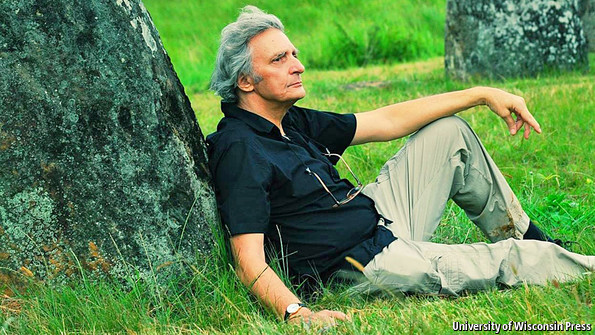 |
Obituary:
Fred Branfman Fred
Branfman, exposer of America’s secret war in Laos, died on September
24th, aged
72 THE peasant
refugees, camped outside Vientiane in Laos, did not want to speak to
him when
he first approached them, in 1969. They were wary of the big, earnest,
bespectacled young American. And they were wretched. They had left
behind their
paddy fields, pigs and buffalo, their fresh air and forests, and pined
for
them. Many were injured, too: blinded, or missing limbs, or riddled
with metal
pellets that showed through their skin. Over the
months, as Fred Branfman gently urged them, they began to talk of war
planes
over their home region, the Plain of Jars. At first, in 1964, they had
watched
them with interest, much as they watched the rockets at the spring
festival of
boun bang fai. Then the planes dived close and aimed at them directly.
They
went on doing so, flying up to 200 sorties a day, for five years. When
Mr
Branfman visited the plain at last in 1993 (pictured), droplets from
cluster
bombs were still exploding. The
thatch-and-timber houses burned like candles, the villagers told him.
All that
was left was the red, bare earth. The paddies and ponds were poisoned,
so the
ducks died. Children picked up bombs, and their arms blew off. Everyone
dug
holes to creep into during the day, emerging at night to try to plant
rice
unseen, but bombs fell into the holes too. An old woman was struck as
she
carried food to market, and a boy found his father killed, alongside
his
buffalo, in a field he was ploughing. Imagine, Mr Branfman thought, if
that was
his own father, the gentle textile sales executive from Great Neck,
Long
Island, whose toil and sweat and ambition for his sons had been
instantly
snuffed out by a plane that, in the repeated mantra of the villagers,
“didn’t
stop”. He had gone
to Laos to teach in his 20s, mostly to avoid the draft for Vietnam. In
that war
Laos was officially neutral, though it was fought over by right- and
left-wing
groups and supply-routes to the Vietcong ran through it. The American
government denied it was conducting a war there, for conventional
warfare was
outlawed. Congress and the public were in the dark. It seemed that only
Mr
Branfman knew. As a Jew he
was inevitably reminded of the Holocaust, another clumsily concealed
atrocity.
It was “as if I had discovered Auschwitz when it was still going on”.
His fury
was never hard to ignite; like many of his contemporaries, he had
burned to
change the world since high school. He had been brought up to believe
America
was good, and triumphed in just wars. Now everything was upended.
America had
betrayed him: it was not merely socially unjust, especially towards
blacks, but
also brutal and criminal abroad. He had to
get the story out. It was easier than he thought, for the villagers
could read
and write as well as draw, with chilling accuracy, T-28s and F-105s
strafing
their hills. Their anonymous memories and sketches became “Voices from
the
Plain of Jars”, published in 1972. By then, President Nixon had
admitted that
America was at war in Laos; but not that it was targeting civilians.
That was still
denied outright by America’s former ambassador to Laos, in front of a
Senate
committee to which Mr Branfman, too, gave evidence. The senators
deferred to the ambassador, he noted. And his book, though it blew open
the
secret, did not sell. Few seemed to care how America’s so-called
democracy
worked: the executive branch and corporate elites uniting to do what
they
liked, and damn the consent of the governed. Mr Branfman decided to
stoke the
fire by starting Project Air War and the Indochina Resource Centre,
both aimed
at ending the conflict, and did not rest until it was over. In the 21st
century
his list of executive outrages grew long again, this time provoked by
the war
on terror: surveillance of Americans by government agencies, the growth
of biometric
databases, expanded powers of detention, pervasive secrecy. In
newspaper
columns he appealed to Americans to resist the growth of a police state. He warned
them, too, that the world was changing for the worse. In Laos he had
heard
repeatedly how huge machines had dealt out death from afar. The use of
drones
in Iraq and Afghanistan was merely a refinement of this remote,
arrogant way of
killing. In Laos he had heard of peaceful, ancient ways of life, in
tune with
nature, obliterated by human greed and barbarity; now global warming,
again
spurred by greed, was threatening mankind as a whole. As before, he
hoped that
if he shouted loudly enough, people would hear. Some did, but once
again
America’s leaders proved stone deaf. Singing against death The problem
with the human race, he concluded, was that it blocked out pain.
Uncomfortable
facts, inconvenient truths, other people’s suffering, were all denied
as long
as possible. And nothing was denied as vigorously as death, though he
knew—from
a brush with it when he was 48—that to face it squarely was also to
draw from
it life-affirming strength. This was the blown-open secret of his last
years,
spent in Budapest beside the Danube. But he had heard it first, like so
much
else, in Laos. A 14-year-old boy told him how he had sung in the
ricefields,
even as the planes passed over. “I felt that although I might have to
die, it
did not matter; that I just had to be happy in the midst of all the
sadness of
war, of the airplanes dropping bombs.”
|
